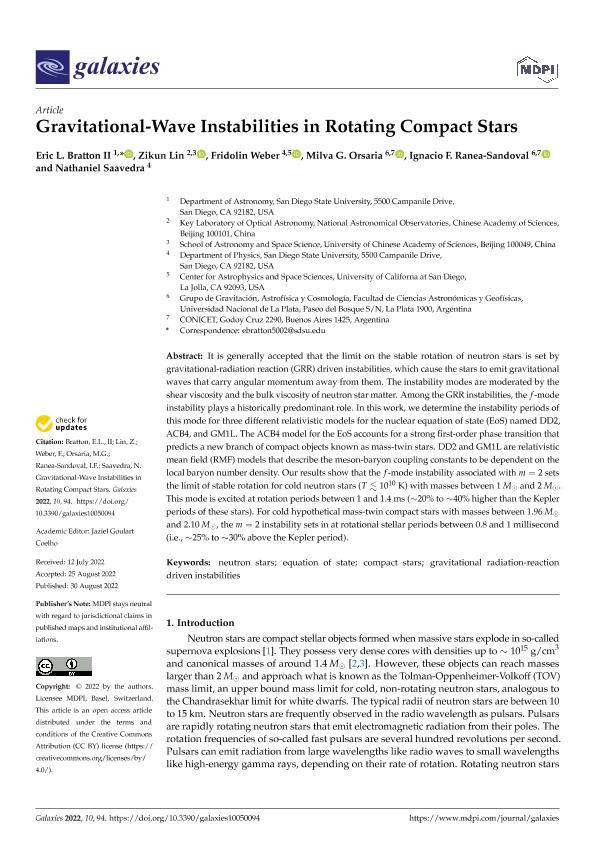Mostrar el registro sencillo del ítem
dc.contributor.author
Bratton, Eric L.
dc.contributor.author
Lin, Zikun
dc.contributor.author
Weber, Fridolin

dc.contributor.author
Orsaria, Milva Gabriela

dc.contributor.author
Ranea Sandoval, Ignacio Francisco

dc.contributor.author
Saavedra, Nathaniel
dc.date.available
2023-11-10T15:58:57Z
dc.date.issued
2022-10
dc.identifier.citation
Bratton, Eric L.; Lin, Zikun; Weber, Fridolin; Orsaria, Milva Gabriela; Ranea Sandoval, Ignacio Francisco; et al.; Gravitational-Wave Instabilities in Rotating Compact Stars; MDPI; Galaxies; 10; 5; 10-2022; 1-23
dc.identifier.issn
2075-4434
dc.identifier.uri
http://hdl.handle.net/11336/217793
dc.description.abstract
It is generally accepted that the limit on the stable rotation of neutron stars is set by gravitational-radiation reaction (GRR) driven instabilities, which cause the stars to emit gravitational waves that carry angular momentum away from them. The instability modes are moderated by the shear viscosity and the bulk viscosity of neutron star matter. Among the GRR instabilities, the f-mode instability plays a historically predominant role. In this work, we determine the instability periods of this mode for three different relativistic models for the nuclear equation of state (EoS) named DD2, ACB4, and GM1L. The ACB4 model for the EoS accounts for a strong first-order phase transition that predicts a new branch of compact objects known as mass-twin stars. DD2 and GM1L are relativistic mean field (RMF) models that describe the meson-baryon coupling constants to be dependent on the local baryon number density. Our results show that the f-mode instability associated with (Formula presented.) sets the limit of stable rotation for cold neutron stars ((Formula presented.) K) with masses between (Formula presented.) and (Formula presented.). This mode is excited at rotation periods between 1 and 1.4 ms (∼20% to ∼40% higher than the Kepler periods of these stars). For cold hypothetical mass-twin compact stars with masses between (Formula presented.) and (Formula presented.), the (Formula presented.) instability sets in at rotational stellar periods between 0.8 and 1 millisecond (i.e., ∼25% to ∼30% above the Kepler period).
dc.format
application/pdf
dc.language.iso
eng
dc.publisher
MDPI
dc.rights
info:eu-repo/semantics/openAccess
dc.rights.uri
https://creativecommons.org/licenses/by/2.5/ar/
dc.subject
COMPACT STARS
dc.subject
EQUATION OF STATE
dc.subject
GRAVITATIONAL RADIATION-REACTION DRIVEN INSTABILITIES
dc.subject
NEUTRON STARS
dc.subject.classification
Astronomía

dc.subject.classification
Ciencias Físicas

dc.subject.classification
CIENCIAS NATURALES Y EXACTAS

dc.title
Gravitational-Wave Instabilities in Rotating Compact Stars
dc.type
info:eu-repo/semantics/article
dc.type
info:ar-repo/semantics/artículo
dc.type
info:eu-repo/semantics/publishedVersion
dc.date.updated
2023-11-10T14:35:23Z
dc.journal.volume
10
dc.journal.number
5
dc.journal.pagination
1-23
dc.journal.pais
Suiza

dc.journal.ciudad
Basel
dc.description.fil
Fil: Bratton, Eric L.. San Diego State University; Estados Unidos
dc.description.fil
Fil: Lin, Zikun. Chinese Academy of Sciences; República de China
dc.description.fil
Fil: Weber, Fridolin. Chinese Academy of Sciences; República de China
dc.description.fil
Fil: Orsaria, Milva Gabriela. Universidad Nacional de La Plata. Facultad de Ciencias Astronómicas y Geofísicas; Argentina. Consejo Nacional de Investigaciones Científicas y Técnicas. Centro Científico Tecnológico Conicet - La Plata; Argentina
dc.description.fil
Fil: Ranea Sandoval, Ignacio Francisco. Universidad Nacional de La Plata. Facultad de Ciencias Astronómicas y Geofísicas; Argentina. Consejo Nacional de Investigaciones Científicas y Técnicas. Centro Científico Tecnológico Conicet - La Plata; Argentina
dc.description.fil
Fil: Saavedra, Nathaniel. San Diego State University; Estados Unidos
dc.journal.title
Galaxies
dc.relation.alternativeid
info:eu-repo/semantics/altIdentifier/url/https://www.mdpi.com/2075-4434/10/5/94
dc.relation.alternativeid
info:eu-repo/semantics/altIdentifier/doi/http://dx.doi.org/10.3390/galaxies10050094
Archivos asociados
